March 18, 1842.
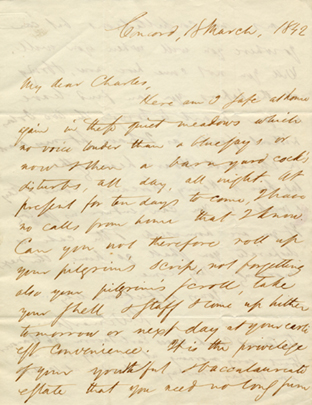 April 9, 1842. 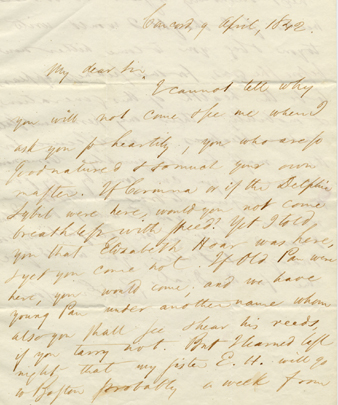 May 7, 1842. 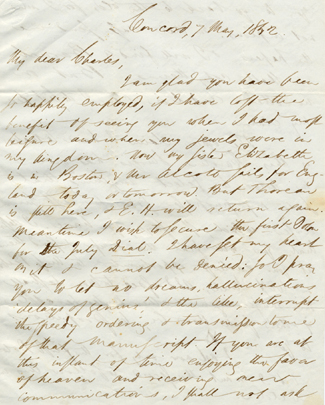 June 8, 1842. 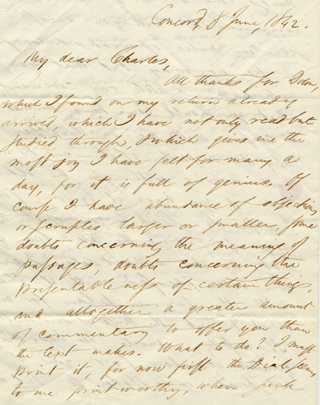 August 16, 1842. 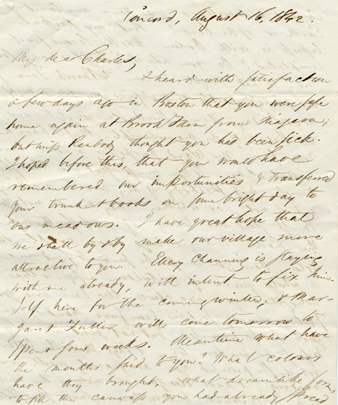 August 9, 1843. 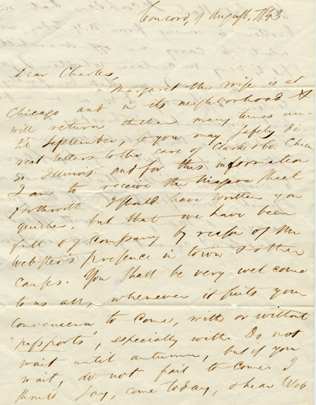 September 1, 1843. 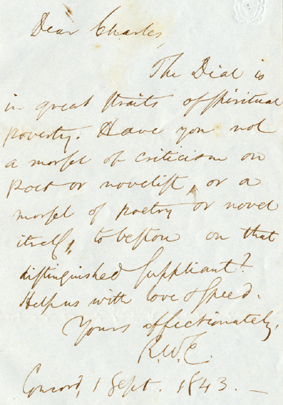
|
LETTERS TO CHARLES
KING NEWCOMB
27. Ralph Waldo Emerson. Seven autograph letters
from a collection of twenty-two letters from Emerson to Charles King Newcomb,
1842-1858. Selection displayed: March 18, April 9, May 7, June 8, and August
16, 1842; August 9, and September 1, 1843. Ink on paper. Collection
presented by Mrs. Arthur Holland, 1929.
In the 1840s, Emerson encouraged a number of young men in whom he saw literary promise, Henry Thoreau, Ellery Channing, Jones Very, and Charles King Newcomb among them. As editor of The Dial, he was in a position to give exposure to the work of unknowns who might otherwise not have had opportunity for publication. Through Emerson’s agency, Newcomb’s “The First Dolon”—part of his “The Two Dolons. From the Ms. Symphony of Dolon”—appeared in the issue for July, 1842. Charles King Newcomb (1820-1894) was raised in relative affluence by a doting mother after his father’s death in 1825. He graduated from Brown University in 1837. From 1841 to 1845 he boarded at Brook Farm, and from 1845 to 1865 lived primarily in Providence. He joined the Tenth Rhode Island Volunteers in 1862 and was sent to defend Washington from possible Confederate attack. He lived in Philadelphia from 1866 to 1871, in Europe from 1871 until his death in Paris in 1894. Newcomb was a diarist, an admirer of Swedenborgian philosophy and at the same time of the trappings of Catholicism, a poet, and a protégé and correspondent of Margaret Fuller as well as of Emerson. His “First Dolon” was his only published work. Emerson first met Charles King Newcomb in Providence in 1840. After he began to edit The Dial, he corresponded with Newcomb, urging him to submit pieces for publication and to visit Concord. In his letters to the young man, he presented an enticing picture of Concord as a place of charming natural appeal, enlivened by the comings and goings of a variety of interesting people. He wrote of Margaret Fuller, Henry Thoreau, Elizabeth Hoar, Bronson Alcott, Caroline Sturgis, Elizabeth Peabody, George Bradford, Nathaniel Hawthorne, Edmund Hosmer, and Ellery Channing. Newcomb visited the Emersons in Concord on June 19, 1842. Although the two remained in contact, Emerson’s enthusiasm for Newcomb cooled over time. By 1848, he referred to him as “the spoiled child of culture.”
No image in this online display may be reproduced in any form, including electronic, without permission from the Curator of Special Collections of the Concord Free Public Library.
Next Entry - Previous
Entry - Back to Section IV Contents Listing
- Back to Exhibition Introduction - Back
to Exhibition Table of Contents
|